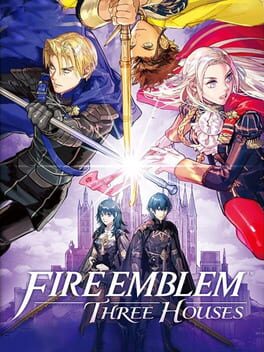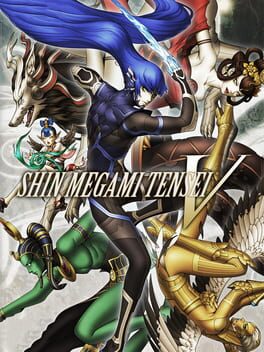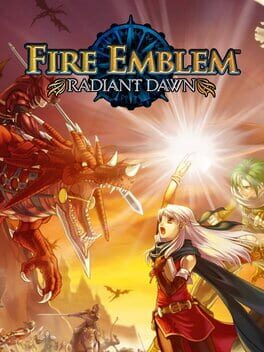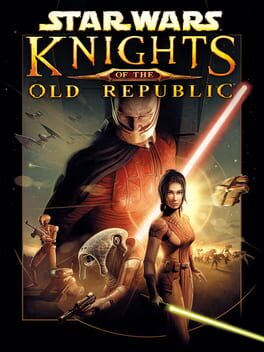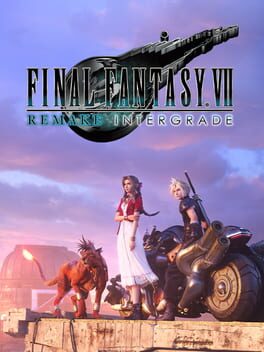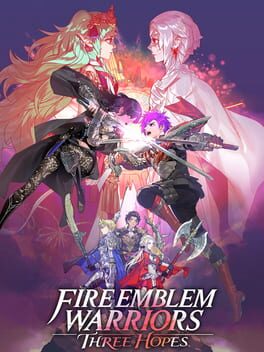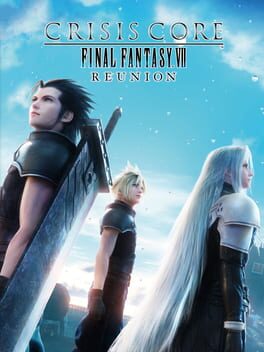LeshenLord
Narratively speaking, Three Houses is by far the most ambitious Fire Emblem I’ve played, although I’ve played a relatively low percentage of the series so far. Radiant Dawn is the only one that comes close in terms of scale and the volume of important characters; a mix of endearing, heartbreaking, and philosophically challenging—with many characters being all three at once.
Three Houses’ grand scale and lofty ambition is perhaps its greatest strength, but simultaneously its biggest weakness, although that’s not entirely the game’s own fault, funnily enough.
The amount of compelling themes and storylines coming out of this game are nothing short of impressively epic (using the word in its non-ironic, intended meaning). Paired with incredible music, consistently engaging writing, impressive voice acting, and perhaps some of the best worldbuilding I’ve seen, the game is a fantastic experience that I would even describe as unmissable for anyone remotely interested in this type of story.
However, this great ambition from the writers was unfortunately cut short by the development time of the game, if I have it right. Several story threads are left either completely hanging or resolved off-screen unsatisfyingly. Several key characters are robbed of their incredible narrative potential because of one of the storylines recylcing 90% of the same content as another. One storyline in particular was evidently done rather late in development and lacked much needed animated cutscenes that other routes did have. These and other miscellaneous missing or questionably-written components to the storylines makes it all the more disappointing how this game was not given the opportunity to reach its peak potential as perhaps one of the best narratives in video games. Several instances of oddly (or even outright incorrectly) translated important lines don’t help us English speakers. The protagonist is also not my favorite. While they have a very interesting backstory, the silent protagonist trope does not do it for me in this particular game.
Another facet where the game struggles is the art direction. The Switch hardware does not allow the game to run at an acceptable framerate with its pseudo-realism style, even at the most important set piece battles. The textures are also extremely low resolution and muddy (especially compared to the higher quality character models) to compensate for the limitations of the hardware (and perhaps the engine as well), which clearly couldn’t solve the core issues anyway. The Support conversation backgrounds are some of the most perplexing workarounds to what I can only guess was a lack of time to design and/or model full 3D spaces, despite most of them being based on pre-existing game locations… The character models, while good looking, don’t have the most impressive animations, especially while speaking in cutscenes or Supports, with odd looking canned animations that don’t flow into each other very well. Despite all this, the actual character designs and drawn portraits are almost all incredible, which is probably what is most important by far to a lot of people. I myself am still disappointed in the rest of the game’s aesthetics.
When it comes to the gameplay, I’d say it’s rather enjoyable. There are many new or reworked game mechanics, terrain types, attack types, etc. The level design does what it needs to do, but it’s no Path of Radiance when it comes to interesting layouts. Three Houses does have several standout maps, though. There are very few maps I disliked. The way you can shape your units in whatever way you please, but still based on individual strengths and weaknesses, put an interesting spin on the class system you typically see in a Fire Emblem game.
At the end of the day, Three Houses is, at the very least, a must-play to even just see a glimpse at what could have been one of the best games of all time...if they had maybe a couple of more years to work on it.
All routes completed, 300+ hours logged, and no regrets.
Three Houses’ grand scale and lofty ambition is perhaps its greatest strength, but simultaneously its biggest weakness, although that’s not entirely the game’s own fault, funnily enough.
The amount of compelling themes and storylines coming out of this game are nothing short of impressively epic (using the word in its non-ironic, intended meaning). Paired with incredible music, consistently engaging writing, impressive voice acting, and perhaps some of the best worldbuilding I’ve seen, the game is a fantastic experience that I would even describe as unmissable for anyone remotely interested in this type of story.
However, this great ambition from the writers was unfortunately cut short by the development time of the game, if I have it right. Several story threads are left either completely hanging or resolved off-screen unsatisfyingly. Several key characters are robbed of their incredible narrative potential because of one of the storylines recylcing 90% of the same content as another. One storyline in particular was evidently done rather late in development and lacked much needed animated cutscenes that other routes did have. These and other miscellaneous missing or questionably-written components to the storylines makes it all the more disappointing how this game was not given the opportunity to reach its peak potential as perhaps one of the best narratives in video games. Several instances of oddly (or even outright incorrectly) translated important lines don’t help us English speakers. The protagonist is also not my favorite. While they have a very interesting backstory, the silent protagonist trope does not do it for me in this particular game.
Another facet where the game struggles is the art direction. The Switch hardware does not allow the game to run at an acceptable framerate with its pseudo-realism style, even at the most important set piece battles. The textures are also extremely low resolution and muddy (especially compared to the higher quality character models) to compensate for the limitations of the hardware (and perhaps the engine as well), which clearly couldn’t solve the core issues anyway. The Support conversation backgrounds are some of the most perplexing workarounds to what I can only guess was a lack of time to design and/or model full 3D spaces, despite most of them being based on pre-existing game locations… The character models, while good looking, don’t have the most impressive animations, especially while speaking in cutscenes or Supports, with odd looking canned animations that don’t flow into each other very well. Despite all this, the actual character designs and drawn portraits are almost all incredible, which is probably what is most important by far to a lot of people. I myself am still disappointed in the rest of the game’s aesthetics.
When it comes to the gameplay, I’d say it’s rather enjoyable. There are many new or reworked game mechanics, terrain types, attack types, etc. The level design does what it needs to do, but it’s no Path of Radiance when it comes to interesting layouts. Three Houses does have several standout maps, though. There are very few maps I disliked. The way you can shape your units in whatever way you please, but still based on individual strengths and weaknesses, put an interesting spin on the class system you typically see in a Fire Emblem game.
At the end of the day, Three Houses is, at the very least, a must-play to even just see a glimpse at what could have been one of the best games of all time...if they had maybe a couple of more years to work on it.
All routes completed, 300+ hours logged, and no regrets.
Pros:
- The amazing combat system from Remake returns with new mechanics, status effects, abilities, and more.
- Level design has been improved from Remake, now with several more modes of traversal than before, and more ways of making your way through dungeons.
- The game world is incredibly content-rich throughout the entire game. Every new area has a new set of unique side-quests. Many of them (even if not all of them) offer additional character development, worldbuilding, and an absurd amount of mini-games with relatively deep mechanics.
- The difficulty is just as satisfying as it was in Remake. It’s satisfying to master the combat system and finish battles optimally with whatever character combination you have with you. You feel like you need to think about your actions, but you still always know that you have a chance to pull through when things get ugly.
- As the plot continues, many additions to the original game’s story go a long way to further accentuate the worldbuilding and characters. The new mystery introduced by Remake makes significant and fascinating developments, while also bringing up new questions that serve to build immense anticipation for the final game.
- Just like Remake, the characters are faithfully realized, and the insane amount of new interaction is a joy to see. Fantastic vocal performances, now with a bit less weird anime grunting!
- Great pacing with each portion of the story feeling rather worthwhile, whether because of it endearing the characters to you or for plot developments.
- Art direction and music are immaculate. Adaptive music makes its glorious return.
-Production value in general is incredible. Cutscenes/cinematography, animation, etc. are top of the line.
Cons:
- Despite level design improvements, puzzles and other roadblocks/pace setters lack much stimulation or variety after the first couple of instances (e.g. Red’s wall walking, mako vacuums, etc.).
- Most of the repeating world activity types were immediately obnoxious, like Lifesprings and Divine Intel.
- Needing to take only one materia at a time when transferring between party members can be somewhat tiresome.
- Despite plot additions being largely positive, things that were changed about the original story were a mixed bag. For example, despite the Nibelheim flashback being mostly incredible, certain dialogue and set pieces being cut down are a huge disappointment. For another example, the big scene with Barret (you know the one) was altered to be far less impactful than the original, for seemingly no reason. Scenes and visuals that are even more iconic and thematically important than this share this issue.
- Lighting took a hit in this game (the only exception in the otherwise great art direction). There’s that visual effect when you are indoors looking into the outdoors where the light from outside shines blindingly. This wouldn’t be as big of a deal if this effect didn’t seemingly also sometimes trigger when you are outdoors too, making the entirety of the background extremely washed out.
Score: 8/10, closer to a 9 than a 7.
- The amazing combat system from Remake returns with new mechanics, status effects, abilities, and more.
- Level design has been improved from Remake, now with several more modes of traversal than before, and more ways of making your way through dungeons.
- The game world is incredibly content-rich throughout the entire game. Every new area has a new set of unique side-quests. Many of them (even if not all of them) offer additional character development, worldbuilding, and an absurd amount of mini-games with relatively deep mechanics.
- The difficulty is just as satisfying as it was in Remake. It’s satisfying to master the combat system and finish battles optimally with whatever character combination you have with you. You feel like you need to think about your actions, but you still always know that you have a chance to pull through when things get ugly.
- As the plot continues, many additions to the original game’s story go a long way to further accentuate the worldbuilding and characters. The new mystery introduced by Remake makes significant and fascinating developments, while also bringing up new questions that serve to build immense anticipation for the final game.
- Just like Remake, the characters are faithfully realized, and the insane amount of new interaction is a joy to see. Fantastic vocal performances, now with a bit less weird anime grunting!
- Great pacing with each portion of the story feeling rather worthwhile, whether because of it endearing the characters to you or for plot developments.
- Art direction and music are immaculate. Adaptive music makes its glorious return.
-Production value in general is incredible. Cutscenes/cinematography, animation, etc. are top of the line.
Cons:
- Despite level design improvements, puzzles and other roadblocks/pace setters lack much stimulation or variety after the first couple of instances (e.g. Red’s wall walking, mako vacuums, etc.).
- Most of the repeating world activity types were immediately obnoxious, like Lifesprings and Divine Intel.
- Needing to take only one materia at a time when transferring between party members can be somewhat tiresome.
- Despite plot additions being largely positive, things that were changed about the original story were a mixed bag. For example, despite the Nibelheim flashback being mostly incredible, certain dialogue and set pieces being cut down are a huge disappointment. For another example, the big scene with Barret (you know the one) was altered to be far less impactful than the original, for seemingly no reason. Scenes and visuals that are even more iconic and thematically important than this share this issue.
- Lighting took a hit in this game (the only exception in the otherwise great art direction). There’s that visual effect when you are indoors looking into the outdoors where the light from outside shines blindingly. This wouldn’t be as big of a deal if this effect didn’t seemingly also sometimes trigger when you are outdoors too, making the entirety of the background extremely washed out.
Score: 8/10, closer to a 9 than a 7.
2021
Pros:
- I appreciate the choice of using DND-like mechanics of combat.
- The plot includes some interesting lore about the distant past of the SW universe (now non-canon, but eh). There’s a very interesting twist in the story.
- Some characters can be somewhat humorous or charming.
- Decent art direction and music that stays true to SW and makes for cool new additions.
Cons:
- Combat was always a slog because of how unresponsive the controls were. It’s hard to keep party members from doing things you don’t want them to do without constantly switching characters and micromanaging their every action, which would draw out battles far too long. The pre-set battle behaviors only do so much.
- Level design is corridors and uninteresting puzzles. Puzzle solutions are either weirdly arbitrary or painfully obvious. The ridiculous amount of backtracking was pretty painful.
- Game balance seems all over the place. The build I chose, a stealth build, turned out mostly nonviable because of forced head-on encounters throughout the game, not to mention your party (which is not stealthy) has to be with you to progress. Combat was a mix of brain-dead-simple encounters and sudden difficulty spikes. In those cases, simply dumping all your consumables onto your characters usually did the trick to brute force past hard battles.
- The UI/UX, on top of being pretty unresponsive, was far too crowded and was a chore to navigate. The massive loot bloat throughout the game did not help this.
- The plot is mostly by the numbers, barring the few interesting aspects noted above.
- Many characters are uninteresting or even annoying. Some character arcs go in odd directions or make big jumps without nearly enough cause.
- Voice acting overall was undercooked and often seemed like they just used the first take from every voice actor, despite the talented names in this game’s cast. It’s worse for characters with less focus, of course.
Score: 4/10, closer to a 5 than a 3.
- I appreciate the choice of using DND-like mechanics of combat.
- The plot includes some interesting lore about the distant past of the SW universe (now non-canon, but eh). There’s a very interesting twist in the story.
- Some characters can be somewhat humorous or charming.
- Decent art direction and music that stays true to SW and makes for cool new additions.
Cons:
- Combat was always a slog because of how unresponsive the controls were. It’s hard to keep party members from doing things you don’t want them to do without constantly switching characters and micromanaging their every action, which would draw out battles far too long. The pre-set battle behaviors only do so much.
- Level design is corridors and uninteresting puzzles. Puzzle solutions are either weirdly arbitrary or painfully obvious. The ridiculous amount of backtracking was pretty painful.
- Game balance seems all over the place. The build I chose, a stealth build, turned out mostly nonviable because of forced head-on encounters throughout the game, not to mention your party (which is not stealthy) has to be with you to progress. Combat was a mix of brain-dead-simple encounters and sudden difficulty spikes. In those cases, simply dumping all your consumables onto your characters usually did the trick to brute force past hard battles.
- The UI/UX, on top of being pretty unresponsive, was far too crowded and was a chore to navigate. The massive loot bloat throughout the game did not help this.
- The plot is mostly by the numbers, barring the few interesting aspects noted above.
- Many characters are uninteresting or even annoying. Some character arcs go in odd directions or make big jumps without nearly enough cause.
- Voice acting overall was undercooked and often seemed like they just used the first take from every voice actor, despite the talented names in this game’s cast. It’s worse for characters with less focus, of course.
Score: 4/10, closer to a 5 than a 3.
Pros:
- Amazing combat system that ingeniously mixes tactical and reaction-based gameplay together.
- Satisfying difficulty in major (and many minor) battles that encourages you to experiment with different loadouts and character builds. Hard mode pushes this idea further to great effect to make you master the combat system.
- Incredible sense of progression through character level-ups, materia level-ups, and learning different weapon skills.
- Great UI/UX that displays all information in a convenient way while matching up very well with the game’s overall art direction.
- Fantastic recreation of the original FFVII’s first several chapters with all the benefits modern presentation can offer. Content from the FFVII Compilation is integrated seamlessly and tactfully to further flesh out the world. A brand-new sense of intrigue is introduced through the addition of a new mystery that incorporates the Compilation as well as completely new lore.
- Much new life is breathed into the cast of characters through ridiculous amounts of new dialogue and interaction between all characters, making their relationships even more believable and entertaining than before. Voice acting in both English and Japanese is fantastic.
- Breathtaking art direction and music. The frequent use of adaptive music throughout is incredibly effective.
Cons:
- The camera can be somewhat unwieldy during battle in tight spaces.
- Level design is basic. Basically just battle gauntlets broken up by puzzles or quick time events. The puzzles/QTEs are mind-numbingly easy and only serve to waste a bit of time.
- A little bit too many trash mobs.
- One portion of the game felt like straight-up filler. Although it was clearly meant to bring character development to someone, the gameplay aspect was just an uninspired chase section. Another portion of the game (in the lategame) went on just a little bit too long.
- Most (although not all) side-quests are boring fetch/kill quests with little entertainment value to speak of. Unfortunately, you are required to do every side-quest if you want to see rather worthwhile extra cutscenes.
- Although it may sound silly, the overuse of “anime grunting/breathing” was actually a little distracting.
Score: 9/10, closer to a 10 than an 8.
- Amazing combat system that ingeniously mixes tactical and reaction-based gameplay together.
- Satisfying difficulty in major (and many minor) battles that encourages you to experiment with different loadouts and character builds. Hard mode pushes this idea further to great effect to make you master the combat system.
- Incredible sense of progression through character level-ups, materia level-ups, and learning different weapon skills.
- Great UI/UX that displays all information in a convenient way while matching up very well with the game’s overall art direction.
- Fantastic recreation of the original FFVII’s first several chapters with all the benefits modern presentation can offer. Content from the FFVII Compilation is integrated seamlessly and tactfully to further flesh out the world. A brand-new sense of intrigue is introduced through the addition of a new mystery that incorporates the Compilation as well as completely new lore.
- Much new life is breathed into the cast of characters through ridiculous amounts of new dialogue and interaction between all characters, making their relationships even more believable and entertaining than before. Voice acting in both English and Japanese is fantastic.
- Breathtaking art direction and music. The frequent use of adaptive music throughout is incredibly effective.
Cons:
- The camera can be somewhat unwieldy during battle in tight spaces.
- Level design is basic. Basically just battle gauntlets broken up by puzzles or quick time events. The puzzles/QTEs are mind-numbingly easy and only serve to waste a bit of time.
- A little bit too many trash mobs.
- One portion of the game felt like straight-up filler. Although it was clearly meant to bring character development to someone, the gameplay aspect was just an uninspired chase section. Another portion of the game (in the lategame) went on just a little bit too long.
- Most (although not all) side-quests are boring fetch/kill quests with little entertainment value to speak of. Unfortunately, you are required to do every side-quest if you want to see rather worthwhile extra cutscenes.
- Although it may sound silly, the overuse of “anime grunting/breathing” was actually a little distracting.
Score: 9/10, closer to a 10 than an 8.
1997
Pros:
- Freedom of character builds through materia make winning battles satisfying.
- Masterfully crafted plot with intriguing mystery, twists and turns.
- Most of the cast gets great character development.
- Good pacing; side quests can be done to take breaks from the big events, or ignored entirely once you want to see what’s in store next.
- Very good art direction.
- Great soundtrack.
Cons:
- Boring level design. Dungeons and whatnot only amount to walking through the area until you get to the end (or find miscellaneous loot off the beaten path). Random encounters are usually a lazy way of setting up battles, and FFVII is no exception. Especially given that these random encounters are relentless and stop you in your tracks at seemingly every opportunity.
- Despite the UI looking aesthetically pleasing, it annoyingly does not allow for enough information to be displayed at once.
- Save points are an annoying save system that does not provide interesting gameplay in a game like this. They work in something like Resident Evil, but in an RPG, it only serves as an artificial roadblock and add more potential for too much lost progress.
- A couple of characters (mainly the optional party members) are unfortunately not as fully explored as other characters, despite being endearing in their own right.
- The ending is too abrupt. Ambiguous endings are all well and good, but there must have been a better way to execute it. The way the ending is makes it seem like it was sequel bait all along, despite the Compilation of FFVII probably not being in their minds at the time.
- The official English translation is downright terrible (even with the updates from most recent versions of the game). I’ve played the game in the fan translation “Beacause” (from “The Reunion” mod), which is an improvement, but I’ve seen the whole game in the original translation as well. Therefore, it feels impossible to experience this game in English in a way that feels completely genuine to the original text (and 100% professional). This point does not contribute so much to the overall score because it’s not really the actual game’s fault that this happened, more so the circumstances surrounding its release in the late 90s. But I thought it was worth mentioning.
Score: 8/10, closer to a 7 than a 9.
- Freedom of character builds through materia make winning battles satisfying.
- Masterfully crafted plot with intriguing mystery, twists and turns.
- Most of the cast gets great character development.
- Good pacing; side quests can be done to take breaks from the big events, or ignored entirely once you want to see what’s in store next.
- Very good art direction.
- Great soundtrack.
Cons:
- Boring level design. Dungeons and whatnot only amount to walking through the area until you get to the end (or find miscellaneous loot off the beaten path). Random encounters are usually a lazy way of setting up battles, and FFVII is no exception. Especially given that these random encounters are relentless and stop you in your tracks at seemingly every opportunity.
- Despite the UI looking aesthetically pleasing, it annoyingly does not allow for enough information to be displayed at once.
- Save points are an annoying save system that does not provide interesting gameplay in a game like this. They work in something like Resident Evil, but in an RPG, it only serves as an artificial roadblock and add more potential for too much lost progress.
- A couple of characters (mainly the optional party members) are unfortunately not as fully explored as other characters, despite being endearing in their own right.
- The ending is too abrupt. Ambiguous endings are all well and good, but there must have been a better way to execute it. The way the ending is makes it seem like it was sequel bait all along, despite the Compilation of FFVII probably not being in their minds at the time.
- The official English translation is downright terrible (even with the updates from most recent versions of the game). I’ve played the game in the fan translation “Beacause” (from “The Reunion” mod), which is an improvement, but I’ve seen the whole game in the original translation as well. Therefore, it feels impossible to experience this game in English in a way that feels completely genuine to the original text (and 100% professional). This point does not contribute so much to the overall score because it’s not really the actual game’s fault that this happened, more so the circumstances surrounding its release in the late 90s. But I thought it was worth mentioning.
Score: 8/10, closer to a 7 than a 9.
Pros:
- Some interesting initial concepts for the plotlines.
- Characters sometimes have interesting or entertaining interactions (notably in Supports).
- Good visual character designs.
- Great music.
Cons:
- Shallow combat with bloated RPG mechanics that don’t contribute to gameplay in any interesting way, which causes the game to be far too long, given the gameplay loop involving far too many systems that the game wants you to keep track of, as well as filler battles.
- Despite the apparent intention to add some amount of strategic depth to gameplay via level and mission design, the level design is nonetheless shallow and always boils down to the same few simple, easy objectives.
- At the end of the day, plotlines are comprised of half-baked ideas to expand upon Three Houses in a “what-if” scenario, but the campaigns end too early and/or reuse too many concepts from Three Houses to be worthwhile.
- Characters’ developments are both too truncated (fast-paced) and also cut short by the end of the game, making it both unsatisfying and leaving too many unanswered questions.
- Aesthetics are plagued by poor framerates, low-quality textures, etc. when it comes to attacks, environments, and animations.
(2/3 routes completed, the last one partially completed)
Score: 3/10, closer to a 4 than a 2.
- Some interesting initial concepts for the plotlines.
- Characters sometimes have interesting or entertaining interactions (notably in Supports).
- Good visual character designs.
- Great music.
Cons:
- Shallow combat with bloated RPG mechanics that don’t contribute to gameplay in any interesting way, which causes the game to be far too long, given the gameplay loop involving far too many systems that the game wants you to keep track of, as well as filler battles.
- Despite the apparent intention to add some amount of strategic depth to gameplay via level and mission design, the level design is nonetheless shallow and always boils down to the same few simple, easy objectives.
- At the end of the day, plotlines are comprised of half-baked ideas to expand upon Three Houses in a “what-if” scenario, but the campaigns end too early and/or reuse too many concepts from Three Houses to be worthwhile.
- Characters’ developments are both too truncated (fast-paced) and also cut short by the end of the game, making it both unsatisfying and leaving too many unanswered questions.
- Aesthetics are plagued by poor framerates, low-quality textures, etc. when it comes to attacks, environments, and animations.
(2/3 routes completed, the last one partially completed)
Score: 3/10, closer to a 4 than a 2.
Pros:
- Good opportunities for the player to customize loadouts and play differently if they choose.
- A few characters have some nice moments here and there (namely Zack, Cloud, and Sephiroth).
- Pacing does not drag on if you don’t want it to (optional content is easy to skip).
- Decent art direction as well as good character designs.
- Good music.
- The famous ending sequence is indeed pretty good.
Cons:
- The game doesn’t encourage you to experiment with loadouts and playstyles very much, as spamming weaknesses or some strong abilities will cheese most enemies (besides a select few bosses).
- Optional content is incredibly vapid and mostly pointless. The content itself is boring, and the rewards you get don’t matter very much when the main story gives you more than enough tools to easily defeat all foes.
- Level design is incredibly boring.
- The UI is annoying to navigate when it comes to items in combat, as there are no item hotkeys, and you’ll have to scroll manually while real-time combat is happening.
- The plot and characters are very much half-baked at best, with character backgrounds/motivations not given time to be properly explored. Even the characters with a lot of clear potential like Zack and Sephiroth—while better than the rest—are still disappointing as the plot moves faster than we can grow to appreciate them.
- Even though vocal performances are mostly an improvement from the original Crisis Core (except, oddly, Zack by a slight margin), the voice actors cannot save the game from its cringey 2000s-era Square nature, what with the bad script and direction.
- Despite good music tracks in a vacuum, there is a somewhat odd combination of different genres that clash. It doesn’t help that transitions between music tracks are overly abrupt.
Score: 3/10, closer to a 2 than a 4.
- Good opportunities for the player to customize loadouts and play differently if they choose.
- A few characters have some nice moments here and there (namely Zack, Cloud, and Sephiroth).
- Pacing does not drag on if you don’t want it to (optional content is easy to skip).
- Decent art direction as well as good character designs.
- Good music.
- The famous ending sequence is indeed pretty good.
Cons:
- The game doesn’t encourage you to experiment with loadouts and playstyles very much, as spamming weaknesses or some strong abilities will cheese most enemies (besides a select few bosses).
- Optional content is incredibly vapid and mostly pointless. The content itself is boring, and the rewards you get don’t matter very much when the main story gives you more than enough tools to easily defeat all foes.
- Level design is incredibly boring.
- The UI is annoying to navigate when it comes to items in combat, as there are no item hotkeys, and you’ll have to scroll manually while real-time combat is happening.
- The plot and characters are very much half-baked at best, with character backgrounds/motivations not given time to be properly explored. Even the characters with a lot of clear potential like Zack and Sephiroth—while better than the rest—are still disappointing as the plot moves faster than we can grow to appreciate them.
- Even though vocal performances are mostly an improvement from the original Crisis Core (except, oddly, Zack by a slight margin), the voice actors cannot save the game from its cringey 2000s-era Square nature, what with the bad script and direction.
- Despite good music tracks in a vacuum, there is a somewhat odd combination of different genres that clash. It doesn’t help that transitions between music tracks are overly abrupt.
Score: 3/10, closer to a 2 than a 4.
2023
Pros:
- Top tier music.
- Superb vocal performances (I played in English).
- Amazing art direction.
- Great cutscenes.
- Satisfying combat with incredible bosses.
- I'm a fan of several main characters.
Cons:
- The majority of supporting/side characters are underwhelming.
- This also means that one of the game's primary themes (strength in friendship) is not nearly as potent as it should be.
- The plot leaves many things inadequately explained.
- The game doesn't use its runtime to explore its mythos, background/worldbuilding, and characters enough.
- Poor pacing; almost all side quests are vapid fetch/kill quests, and the ones that are worth it for character interactions still mostly have boring quest content. Even the main quest contains similar tedium between the good parts.
- RPG mechanics are lacking; stats/accessories/etc. don't mean much and should've been done away with if they wanted to lean fully into action gameplay. Party members should have gotten more to do in combat.
- Between boss fights, the game mostly throws trash mobs at you, making the combat boring for long stretches of time.
Score: 6/10, closer to a 7 than a 5.
Edited: Changed formatting, added more thoughts, slightly adjusted score.
- Top tier music.
- Superb vocal performances (I played in English).
- Amazing art direction.
- Great cutscenes.
- Satisfying combat with incredible bosses.
- I'm a fan of several main characters.
Cons:
- The majority of supporting/side characters are underwhelming.
- This also means that one of the game's primary themes (strength in friendship) is not nearly as potent as it should be.
- The plot leaves many things inadequately explained.
- The game doesn't use its runtime to explore its mythos, background/worldbuilding, and characters enough.
- Poor pacing; almost all side quests are vapid fetch/kill quests, and the ones that are worth it for character interactions still mostly have boring quest content. Even the main quest contains similar tedium between the good parts.
- RPG mechanics are lacking; stats/accessories/etc. don't mean much and should've been done away with if they wanted to lean fully into action gameplay. Party members should have gotten more to do in combat.
- Between boss fights, the game mostly throws trash mobs at you, making the combat boring for long stretches of time.
Score: 6/10, closer to a 7 than a 5.
Edited: Changed formatting, added more thoughts, slightly adjusted score.
